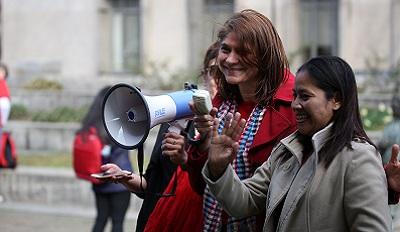
There is a thirst for truth, accuracy and transparency among the public in our current political climate, and global multinationals are no exception to those expectations.
As posted previously on this blog, Nike’s refusal to cooperate with a respected civil society organization flew in the face of the growing trend towards supply chain transparency – a trend that Nike helped to start. As a result of intense campaigning by workers, students and activists, Nike stepped forward this week and made groundbreaking commitments to independent monitoring of working conditions at the factories that make Nike clothes and shoes. This campaign demonstrates, again, that when students put their hearts and minds together, there is no limit to what they can achieve. If the largest sportswear brand in the world can be convinced to change course, anything is possible.
Campaigns to motivate enormous apparel companies to take action on issues in their supplier factories are challenging. After all, global brands have created a complex, layered global supply chain rife with subcontracting, where they can intentionally distance themselves from sweatshops and scandals. What successful campaigns have in common is collaboration between consumers and workers, who often must continue the fight for years before seeing results. Though Nike should be commended for making these commitments, it’s important to note that the brand didn’t exactly come willingly. In this case, it took nearly two years of garment worker strikes, student action, and coordinated support from the global labor community to bring Nike to the negotiating table.
This campaign began and ended with the diligent activism of garment workers. In 2015, workers at the Hansae factory in Vietnam went on strike in response to a number of labor violations, including wage theft and persistent mass faintings due to overwork and the temperature inside the building. The Worker Rights Consortium (WRC) learned that the workers were out on strike and attempted to investigate the conditions that led to these actions. Nike replied that, contrary to their practice for the first seventeen years the WRC has existed and investigated factory compliance with university labor codes, they would no longer allow WRC monitors to enter their supplier factories.
International labor NGOs sprang into action in response. United Students Against Sweatshops (USAS) launched a campaign on 25 college campuses. Multiple campuses severed or declined to renew their contracts with Nike as a result of escalating student campaigns. More than 600 university faculty members sent a letter to Nike demanding they reverse this policy. USAS brought Noi Superlai, a former Nike worker and union president in Thailand, to the U.S. in 2016 to speak to students about her experiences. This year, our organization, the International Labor Rights Forum, joined with USAS to help bring Sophorn Yang, president of the Cambodian Alliance of Trade Unions, to travel coast-to-coast in the United States speaking to students and community members about the mass fainting episodes women garment workers have experienced in Nike’s supplier factories in Cambodia. Hansae workers also testified on film, despite great personal risk, about their experiences with abuse while working in the factory. Grassroots unions, worker centers and student groups marched and demonstrated in 25 cities across 12 countries for a Global Day of Action in July.
Georgetown University students were especially dogged, with eight students enduring disciplinary probation for occupying Georgetown President Jon DeGioia’s office. As a result, the university let its contract with Nike expire and Nike management decided to sit down with Georgetown officials and discuss an access agreement for the WRC, announced this week. Nike agreed to use all economic leverage available to it in order to facilitate the WRC’s access into Nike’s supplier factories, at the monitor’s request and to guarantee the WRC access to take photographs, review and copy factory documents, and interview both workers and managers. After an inspection, Nike has agreed to collaborate with the WRC, the factory and any other brands producing there to develop and execute a remediation plan to correct any labor rights violations.
We are thrilled that Nike has resumed its commitment to enabling worker rights advocates to investigate workers’ complaints. We hope other brands will follow Nike’s leadership and adopt similar commitments – not as the result of a global campaign, but because it’s the most effective path forward. It’s a simple truth: workers’ rights can only be ensured if they have access to effective remediation.
United Students Against Sweatshops, International Labor Rights Forum, Clean Clothes Campaign and other campaign organizations play a critical role in amplifying the organizing efforts and challenges of grassroots unions in garment-exporting nations. In recent years, this coordination between garment workers and western campaign organizations has brought significant financial settlements from companies who initially denied any economic responsibility. But to uncover such labor rights violations, independent monitors need access to speak to garment workers themselves, and to review employer documents – which is why factory access of the type that Nike agreed to is so critical.
The public is no longer willing to accept arguments about “trade secrets” and “competitive advantage” as a justification for keeping supply chains opaque.

